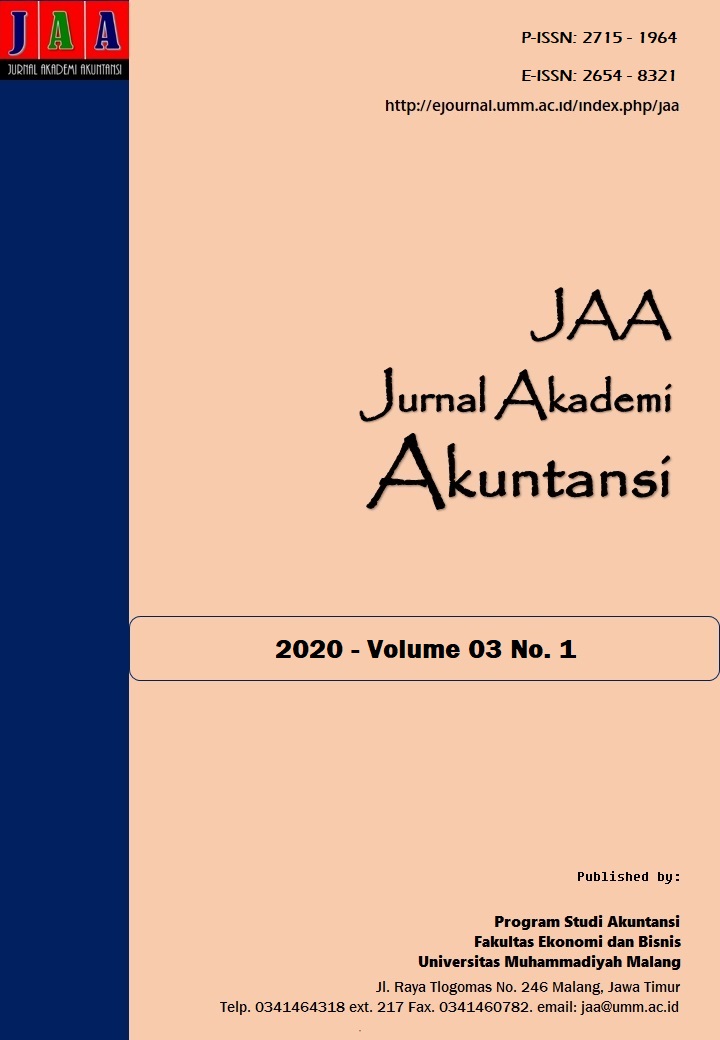PERPUTARAN MODAL KERJA, LIKUIDITAS DAN PROFITABILITAS PERUSAHAAN
DOI:
https://doi.org/10.22219/jaa.v3i1.11892Keywords:
Liquidity, Profitability, Working Capital TurnoverAbstract
The purpose of this research is to examine the influence of working capital turn over and liquidity to profitability. The population in this research is all of the fast-moving consumer goods listed company in the Indonesian Capital Market Directory and publishes financial reports in 2016-2018. A sample is determined by a purposive sampling technique based on specified criteria and obtained as many as 24 companies. The research data is secondary data with the collection method uses documentation technique. Data analysis uses Multiple Linear Regression. The results show that working capital turn over (WCTO) and liquidity (CR) simultaneously have a significant effect on profitability (ROA) amount 34,6% while there remaining 65,4% is influenced by other factors. Partially, the working capital turn over (WCTO) variable has a significant effect on profitability (ROA) and liquidity (CR) variable has a significant effect on profitability (ROA).
Downloads
References
Ariyanti, D. 2015. “Pengaruh Modal Kerja, Perputaran Modal Kerja, Perputaran Aktiva Lancar, Likuiditas dan Leverage Keuangan terhadap Profitabilitas pada Perusahaan Dagang dan Jasa yang Terdaftar di Bursa Efek Indonesia”. Jurnal Akuntansi, Vol. 1, No. 1.
Kasmir. 2016. Analisis Laporan Keuangan. Jakarta: PT. Raja Grafindo Persada.
Meidiyustiani, R. 2016. “Pengaruh Modal Kerja, Ukuran Perusahaan, Pertumbuhan Penjualan dan Likuiditas terhadap Profitabilitas pada Perusahaan Manufaktur Sektor Industri Barang Konsumsi yang Terdaftar di Bursa Efek Indonesia”. Jurnal Akuntansi, Vol. 5, No. 2.
Munawir, S. 2014. Analisa Laporan Keuangan. Yogyakarta: Liberty.
Sawir, A. 2009. Analisis Kinerja Keuangan dan Perencanaan Keuangan Perusahaan. Jakarta: PT. Gramedia Pustaka Utama.
Susiana, A. 2009. “Pengaruh Perputaran Modal Kerja terhadap Profitabilitas Perusahaan Go Publik (Studi Empiris pada Perusahaan LQ-45 di BEI)”. Skripsi Jurusan Akuntansi, Fakultas Ekonomi & Bisnis, Universitas Muhammadiyah Malang.
Downloads
Published
Issue
Section
License
Copyright (c) 2020 Ahmad Juanda, Ginanjar Arief Setyabudi

This work is licensed under a Creative Commons Attribution-NonCommercial-ShareAlike 4.0 International License.
Jurnal Akademi Akuntansi is licensed under a Creative Commons Attribution-NonCommercial-ShareAlike 4.0 International License.
Authors who publish with this journal agree to the following terms:
- Authors retain copyright and grant the journal right of first publication with the work simultaneously licensed under a Creative Commons Attribution-NonCommercial-ShareAlike 4.0 International License that allows others to share the work with an acknowledgment of the work's authorship and initial publication in this journal.
- Authors are able to enter into separate, additional contractual arrangements for the non-exclusive distribution of the journal's published version of the work (e.g., post it to an institutional repository or publish it in a book), with an acknowledgment of its initial publication in this journal.
- Authors are permitted and encouraged to post their work online (e.g., in institutional repositories or on their website) prior to and during the submission process, as it can lead to productive exchanges, as well as earlier and greater citation of published work (See The Effect of Open Access).
Jurnal Akademi Akuntansi dilisensikan di bawah lisensi Creative Commons Attribution-NonCommercial-ShareAlike 4.0 International.
Penulis yang menerbitkan artikel di jurnal ini menyetujui ketentuan berikut:
- Penulis mempertahankan hak cipta dan memberikan hak jurnal atas publikasi pertama dengan karya yang secara serentak dilisensikan di bawah Lisensi Pengaitan Creative Commons yang memungkinkan orang lain untuk berbagi karya dengan pengakuan atas karya penulis dan publikasi awal dalam jurnal ini.
- Penulis dapat masuk ke dalam pengaturan kontrak tambahan yang terpisah untuk distribusi non-eksklusif versi karya jurnal yang diterbitkan (misalnya, mempostingnya ke repositori institusional atau mempublikasikannya dalam sebuah buku), dengan pengakuan publikasi awalnya di jurnal ini.
- Penulis diizinkan dan didorong untuk memposting pekerjaan mereka secara online (misalnya, di repositori institusional atau di situs web mereka) sebelum dan selama proses pengajuan, karena dapat mengarah pada pertukaran produktif, serta kutipan pekerjaan sebelumnya dan yang lebih besar (Lihat Pengaruh Akses Terbuka).
























